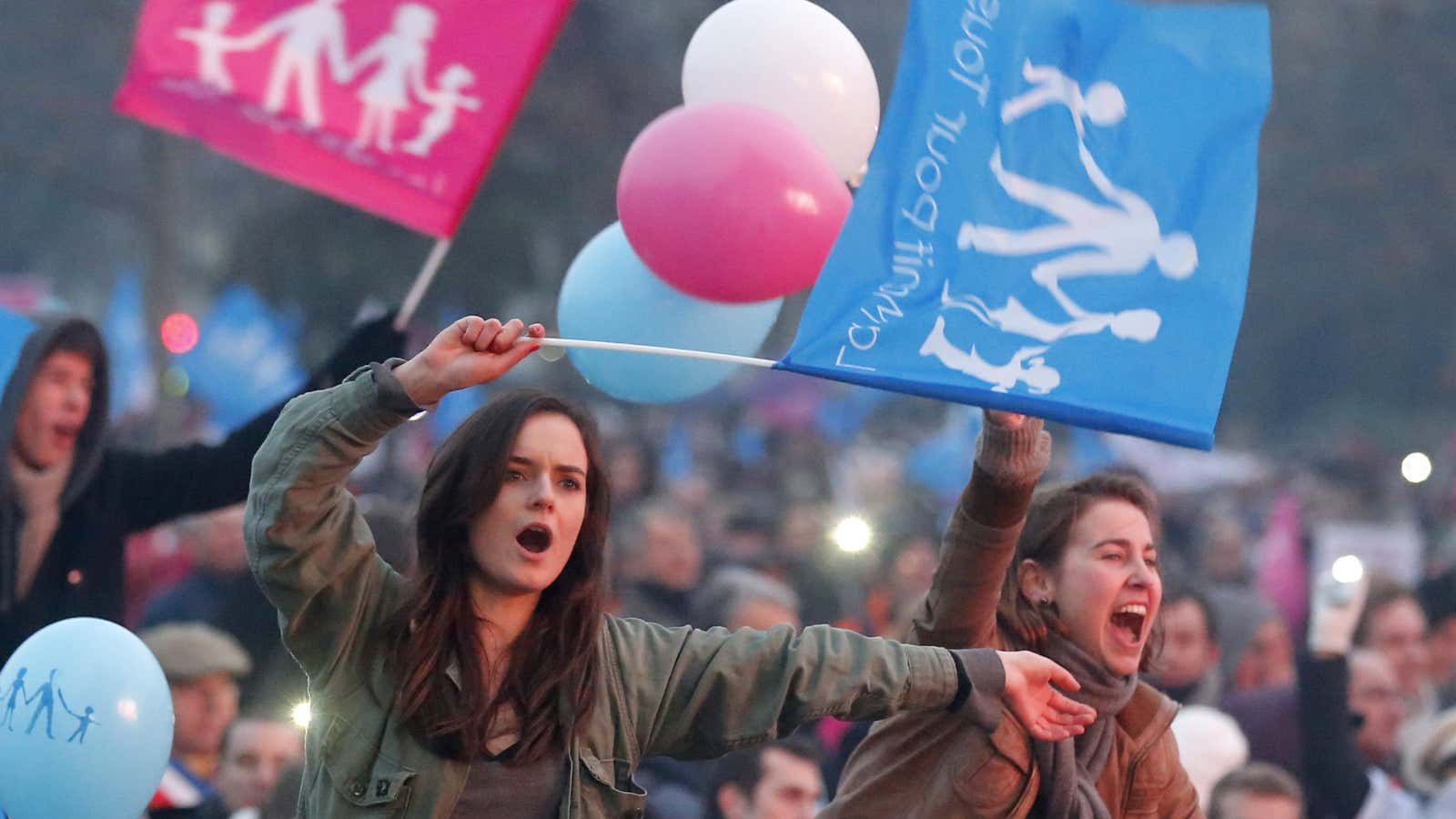France is gearing up for another round of mass demonstrations against gay marriage, as new laws granting same-sex couples the same legal status as wedded heterosexuals, including adoption rights, come before the Senate.
Hundreds of thousands opposed to the changes, drawn up by President François Hollande’s Socialists and already approved by the National Assembly, are expected to flock to Paris (organizers are hoping for a million) for next week’s Manif pour Tous (Demo for Everyone). There will even be simultaneous marches by sympathetic Christian groups in London.
But a radical group of breakaway, hardline pre-Vatican II Catholics called Civitas is planning a different anti-gay marriage protest—a public demonstration of street prayer (French)—that has been branded by some political figures as an ‘‘illegal’’ affront to the intensely secular French republican state.
A smattering of outspoken left-wing figures (French) in the Socialist majority, parliamentarians Yann Galut and Alexis Bachelay, and gay activist groups have condemned the move to bring religion into the public square. But right-wing and centrist groups that have been crying foul over French Muslims performing their daily prayers in public have suddenly gone silent, along with the Socialist Party leadership.
Surely, it is time France dropped the double standard and applied its strict regime outlawing public displays of religion equally to militant Christians and devout Muslims. Either that, or relax the draconian interpretation of laïcité (secularism) as it is applied to most French Muslims (typically immigrants and their offspring hailing from former French colonies) and let the militant Christians continue to conduct their prayer protests in peace.
The group’s leader, Alain Escada, is calling all militants to assemble outside the French Senate, just as they did in late January when hundreds knelt down in the streets outside the National Assembly to pray the rosary in the hope of changing the attitudes of parliamentarians in favor of this law ‘‘against nature.”
‘‘Prayer is the most powerful weapon against the forces of evil,’’ Escada said.
Already, the strong left faction of the incumbent Socialists have called for a police and Interior Ministry ban on such street prayer demonstrations, invoking the 1905 law of separation of church and state. The demands were brushed aside, but this week French gay activist associations called for Civitas itself to be banned. All Out says the group should be stripped of its special charitable status allowing tax-free donations on the grounds of its ‘‘extreme homophobia’’ and ‘‘anti-republican’’ propensity to pray in the French public space.
Civitas is dominated by ex-communicated Latin mass-loving dissident Catholic clerics. The organization has links to the far right National Front (French) and some members express clear sympathy for collaborationist WWII France under Maréchal Petain’s Vichy regime. With a membership estimated at more than 100,000, it is commited to the ‘‘crusade’’ of the ‘‘Re-Christianisation’’ of France under its ‘‘Catholic nationalism’’ creed.
Even if extreme right wing fringe Catholics are escaping the attention of the mainstream political establishment, in contemporary France, where the burka is banned and the Islamic headscarf outlawed in schools, praying in public is sometimes considered an incendiary political act, that is even treasonous or terrorist. Many Muslims lacking sufficient houses of worship for their daily and especially Friday prayers have been obliged to use abandoned carparks and disused fire stations to avoid arrest. Meanwhile public opposition to the construction of mosques continues in parts of French suburbs where many migrants live.
Far right National Front leader Marine Le Pen inflamed racial and religious tensions in 2011 when she compared French Muslims saying their prayers in the street to an ‘‘occupying force’’ akin to the Nazis.
Former president Nicolas Sarkozy and his center-right Union for Popular Movement (UMP) jumped on the bandwagon, explicitly banning the practice and pledging to bring in the police enforce the edict, a ban that was warmly backed by Civitas.
Anxious about its electoral chances amid rising anti-immigrant sentiment, the Socialist Party endorsed the policy, saying it would not allow such attacks on the French value of laïcité.
To American, British or Australian eyes, the French state’s crackdown on public displays of religiosity may seem extreme. But after all, what is so ”offensive” about public prayer is that the rules prohibiting it are simply not being applied with the same rigor to the renegade Catholic agitators.
As a letter to the editor in Marianne magazine said, secularism in France appears to have a ‘‘variable geometry’’ depending on whether you are Muslim or Christian.
That just isn’t égalité.
